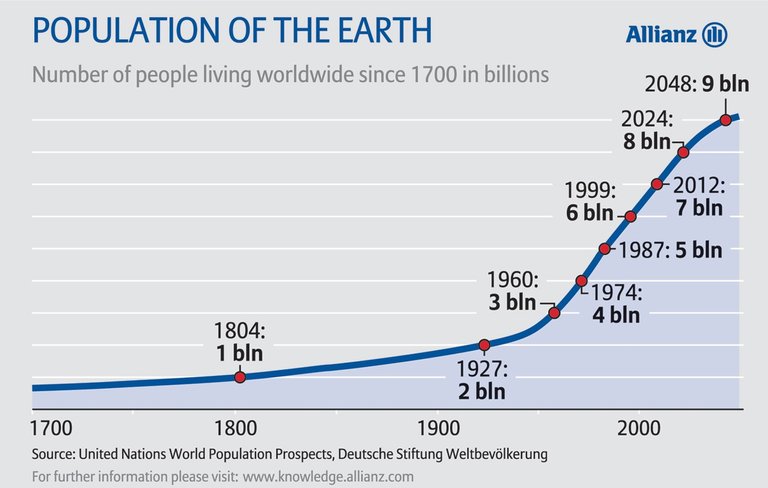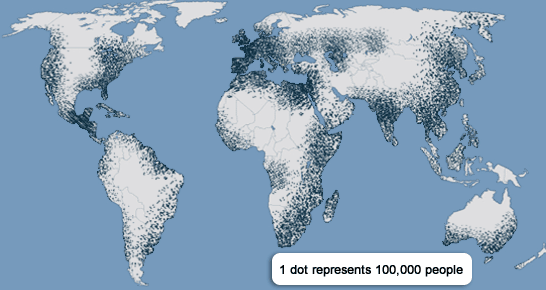The Future Of Mass Population Distribution Shifts

I recently listened to a talk by Elon Musk about the future (For the life of me I can’t find the talk) and he responds to a question by saying that the world population is slowing down and as countries become more developed, will stop growing almost entirely. He has a point to this statement, as we can see countries like Japan, Ukraine, Russia and Belarus, all losing a percentage of their population per year, increasingly. However this fact doesn’t take into account countries that are growing at staggering rates, like Lebanon which grew 9.37% or Zimbabwe, which grew a large 4.36 % in 2016. In fact almost all of Africa is consistently growing at a fast rate every year and this is within countries that have many deaths due to factors that most of the first world could avoid. Rather than seeing a global population decrease, I foresee a mass population distribution shift happening in the next 50-100 years.
Developed countries in the western world, specifically in Europe seem to be lacking population growth while population within countries in the middle east and Africa are predicted to grow exponentially. In addition as we continue to see strong population growth in countries like China and India, bringing large amounts of people into areas that don’t possess the infrastructure to support them, we will most likely see a spillage over into other countries. I strongly believe there is a strong possibility of completely undeveloped countries in Africa and the middle east surpassing the population of countries like China and India in the next 100 years.

As countries are becoming more and more developed, the need for a large amount of children falls, which means a decrease in their birth rates, however countries that still rely on a large families to work agriculturally in the fields to support their families will continue strong growth. Little investment is going into these undeveloped countries, but there is still strong growth regardless. If we see infrastructure creation, production of medical vaccines and other additions that will increase the life expectancy, population growth will be even greater. The world’s population in undeveloped countries is going to completely shift the distribution globally. Europe, Canada and America will be dwarfed by the Eastern world in terms of population.
If the population continues to shrink in western nations, there will no doubt be a need for more immigration from countries like China and India to support current economies. Countries that are relatively homogeneous, over time will start to diversify because of this needed immigration. However, some countries are almost entirely against immigration and it is starting to have more noticeable effects over time. Japan for example who barely takes in any immigrants, and the ones they do, society treats them as outsiders, is struggling because they are not taking the smartest minds in the world and educating them. This has been one of the main reason why America has stayed so competitive, but Japan ‘s population does not want immigration.

So while I do partly agree with Elon Musk, I do think that globally we are going to see the same trend in population we have seen in the past, just the distribution of where the population is, will shift dramatically. The US is still growing but has definitely slowed down in the past few decades as we have entered a more modern era. I don’t foresee shrinkage there any time soon though. However compared to other countries that are literally doubling every couple of decades, eventually US population will look small. Many places like China have the room to include large amounts of new people into their society, but other places do not. When you factor in that most people will be moving towards and working in cities, we are getting closer to an age of metropolis. The population distribution that I believe will happen in the next 100 years will create new economically powerful cities and countries that we couldn’t even predict now.
-Calaber24p
Not to mention birth control will be available to people it was never available to before. My only question is, what happens to the numbers if we all start living to 120?
Author, John Varley, wrote one of my favorite sci-fi / speculative fiction novels of all time. The main character is one of the oldest humans living as one of the vanguard of those benefiting from functionally infinite life extension tech.
The book is titled "Steel Beach"
https://www.amazon.com/Steel-Beach-John-Varley-ebook/dp/B00AFX4EFY/
We become wise enough to help people understand the perils of recreational breeding.
I suspect that recreational breeding is mostly impoverished, disenfranchised people who struggle with feeling like a loser because they aren't rich or famous and seeking escape engage in the best feeling in the world - that's free. If I felt shytty & hopeless all of the time, I'd want to have sex as much as possible! Sure, sure, there's all sorts of "pick yourself up and get a job!" talk, but if you aren't in their shoes, then shut the fark up. :-) Then there's religious people who see fit to make many more subjects. Some people breed simply because they think that it is what they're supposed to do. Sadly, there are also those who feel that breeding is the only way to be relevant in a world constantly distracted by the shiney, shiney.
What should we expect when our culture is maniacally focused on the shallower, competitive aspects of being a human? Our education system has been underfunded and mismanaged for decades, and hardly anyone has time for their kids - "go watch TV or YouTube" - often because the parent is stressed to the gills with just staying afloat, let alone dealing with a jackarse boss, bills, an annoying neighbor and that one shutter than keeps coming loose and banging on the house ...
Good points and I couldn't agree more!
Haha! It will be hard a sell! :)
I think Elon Musk is right. Instead of looking at the % increase in population (which is often down to improved healthcare), look at the birthrate. It is down sharply, even in Africa, and as countries get richer their birthrate drops.
It's true that last year China's population increased by 7 million last year, but what the top-line figures hid was that their pensioner population increased by 10 million, but their working age population decreased by 3 million. At some point the "hump" of old people who were born in the high birthrate 1950's and 60's will pass away, and you'll get a sudden drop as younger generations are smaller cohorts. This is happening already in Japan.
Well see, you make good points, but if we look at countries that are undeveloped with average life spans of 40, when they become developed, in my opinion their population is going to catch up to countries that are now already mid/highly developed. Africa and the Middle East are the areas I mostly think are going to have massive population booms.
The problem with this, is that when you have that many people squished into a small geographical area, the rule and regulation of your life by the govt will have to increase tenfold, to keep people civilized and their tempers passive.
It's not going to be a pretty picture.
Unfortunately I agree, I dont see the mass surveillance and control of people stopping any time soon. The majority of people have shown they mostly don't care about the topic by just sitting by and letting it happen.
Population growth is very unpredictable. In the natural world, it largely contingent on food availability. the more plant life the more plant eaters . The more plant eaters, the more predators. Our human world is similar. Albeit we have other factors like economy and artificial population control such as was in China in the late 20th century.
Its unpredictable, but developed countries have the power to feed everyone relatively cheaply with better agricultural techniques, GMOs ect this will most likely only continue.
The overall growth rate is going down. (time to get busy people!)
 Source: http://www.worldometers.info/world-population/
Source: http://www.worldometers.info/world-population/
It is, but developed countries greatly skew that statistic. In my opinion the places where it is still going strong are most likely going to continue going strong because they are nowhere near developed and still have a need for extremely large families.
True, but how will rapid technology integration change that? Cell phones moved across the globe, even into very undeveloped areas. Global economics may also bring on a rapid incline of development, in relation to current economic norms for those geo's. Thoughts?
That's an interesting analysis. I think you may be right. Where I disagree with many experts is on this, I think it's up to us whether that is a good thing, or a bad thing.
Continuing globalization and the huge incentives for developing the third world will drive development, and with that, higher standards of living.
Advances in agriculture should be able to support this population growth, and eventually, we should likely expect stagnation. However, the synthesis of biology and technology will extend the human lifespan. Biotechnology is the modern fountain of youth, and if we solve death, any reproduction will increase population and corresponding resource strain.
A population pardox will occur; in the future, the population will be driven not by an increasing birthrate, but rather a decreasing death rate. As much as we hope to live in an age of abundance, the fact remains that resources are limited and a resulting systemic shortage could result in catastrophe.
This is a great article. Thanks for sharing. Happy to upvote and share this on Twitter✔ for my followers to read. Now following and looking forward to reading more of your posts. Cheers. Stephen
Africa has such enormous potential. Westerners are already flocking to Kenya. It will incredibly ironic when we begin to hear the label: American-African.